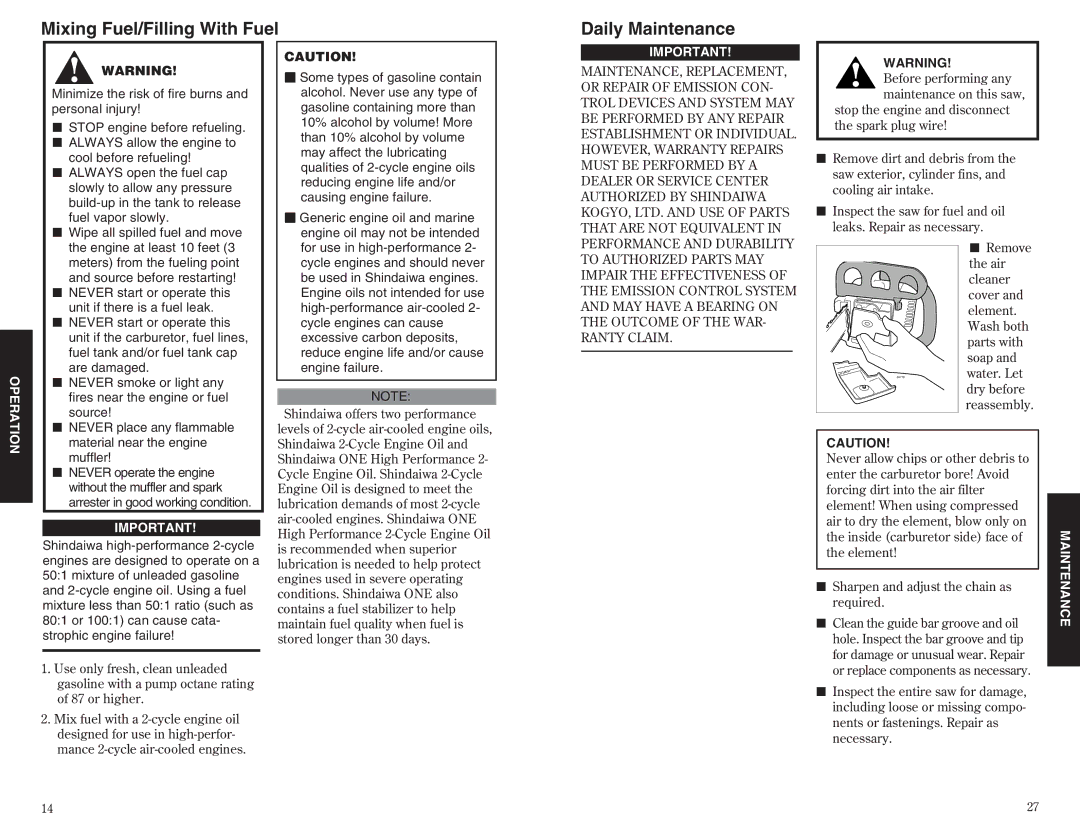
Mixing Fuel/Filling With Fuel
Daily Maintenance
OPERATION
WARNING!
Minimize the risk of fire burns and personal injury!
■STOP engine before refueling.
■ALWAYS allow the engine to cool before refueling!
■ALWAYS open the fuel cap slowly to allow any pressure
■Wipe all spilled fuel and move the engine at least 10 feet (3 meters) from the fueling point and source before restarting!
■NEVER start or operate this unit if there is a fuel leak.
■NEVER start or operate this unit if the carburetor, fuel lines, fuel tank and/or fuel tank cap are damaged.
■NEVER smoke or light any fires near the engine or fuel source!
■NEVER place any flammable material near the engine muffler!
■NEVER operate the engine without the muffler and spark arrester in good working condition.
IMPORTANT!
Shindaiwa
1.Use only fresh, clean unleaded gasoline with a pump octane rating of 87 or higher.
2.Mix fuel with a
CAUTION!
⬛Some types of gasoline contain alcohol. Never use any type of gasoline containing more than 10% alcohol by volume! More than 10% alcohol by volume may affect the lubricating qualities of
⬛Generic engine oil and marine engine oil may not be intended for use in
NOTE:
Shindaiwa offers two performance levels of
IMPORTANT!
MAINTENANCE, REPLACEMENT, OR REPAIR OF EMISSION CON- TROL DEVICES AND SYSTEM MAY BE PERFORMED BY ANY REPAIR ESTABLISHMENT OR INDIVIDUAL. HOWEVER, WARRANTY REPAIRS MUST BE PERFORMED BY A DEALER OR SERVICE CENTER AUTHORIZED BY SHINDAIWA KOGYO, LTD. AND USE OF PARTS THAT ARE NOT EQUIVALENT IN PERFORMANCE AND DURABILITY TO AUTHORIZED PARTS MAY IMPAIR THE EFFECTIVENESS OF THE EMISSION CONTROL SYSTEM AND MAY HAVE A BEARING ON THE OUTCOME OF THE WAR- RANTY CLAIM.
WARNING!
Before performing any maintenance on this saw,
stop the engine and disconnect the spark plug wire!
■Remove dirt and debris from the saw exterior, cylinder fins, and cooling air intake.
■Inspect the saw for fuel and oil leaks. Repair as necessary.
■Remove the air cleaner cover and
| element. |
| Wash both |
| parts with |
| soap and |
35718 | water. Let |
| dry before |
| reassembly. |
CAUTION!
Never allow chips or other debris to enter the carburetor bore! Avoid forcing dirt into the air filter element! When using compressed air to dry the element, blow only on the inside (carburetor side) face of the element!
■Sharpen and adjust the chain as required.
■Clean the guide bar groove and oil hole. Inspect the bar groove and tip for damage or unusual wear. Repair or replace components as necessary.
■Inspect the entire saw for damage, including loose or missing compo- nents or fastenings. Repair as necessary.
MAINTENANCE
14 | 27 |
